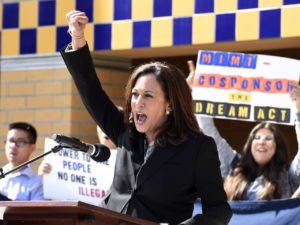
Before Kamala Harris’ most recent town hall in Nevada, her senior adviser Emmy Ruiz took the stage to offer headsets and encourage voters to pose questions to Harris in Spanish, promising translation in real time.
It was a unique gesture of welcome at a time when many Latino voters feel vilified by President Trump, with his untiring push for a border wall and his denunciations of border-crossers as criminals. It was also yet another sign of the Harris campaign’s vigorous efforts to engage Latino voters, particularly women, as her team tries to weave together a coalition to win the 2020 Democratic primary.
With Harris’ high-profile advocacy on immigration issues, her tough questioning of Trump administration officials who oversee border policy and family separations, and her refusal to support any funding for Trump’s wall, the California senator is attempting to shape her image as an advocate for Latino communities far beyond California.
The politics of that quest are no accident; in the 2020 presidential election, Latinos will be the largest ethnic minority group in the electorate, according to a recent study by the Pew Research Center. They could be a huge factor in determining the winner of early Democratic contests like Nevada, California and Texas, a state that offers a trove of 200 delegates — and where Harris will campaign for the first time Saturday.
“The Latino community deserves to be organized, engaged and mobilized — and that was the No. 1 driver of why I joined the (Harris) campaign,” said Ruiz, a seasoned organizer who helped launch Hillary Clinton’s 2015 program “Mujeres in Politics” to get more Latinas registered to vote and involved in organizing. “She’s an immigrant kid, like so many of us. She’s a woman of color. She gets those different challenges so many of us face in the workplace, in our homes, in breaking barriers as first-generation kids. So we really have to take that story to them” said Ruiz.
The campaign, Ruiz noted, is focused on creating more “access points” and “entry points” for participation for Latino voters. In this crowded field of Democratic candidates, there is almost no polling so far to indicate whether Latino voters are leaning toward one candidate, as they did toward Clinton in 2016. But the opportunity to make headway early within that influential demographic group has made a number of the 2020 hopefuls frequent visitors to the early caucus state of Nevada, where 17% of the electorate was Latino in 2016.

Recent Comments